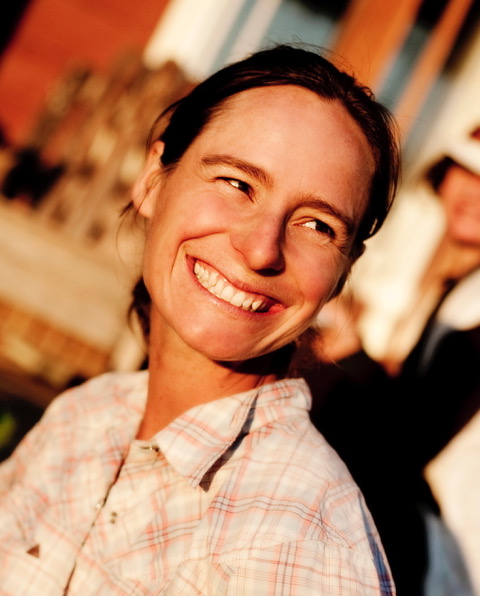SPRING AT VALLEY FLORA FARM
Zoe Bradbury
Photo courtesty of Zoe Bradbury
Zoe Bradbury was born and raised on the southern coast of Oregon. After earning a degree at Stanford University and working for ten years on various organic farms and non-profits, Zoë and her two draft horses came home to Floras Creek. In 2008, Valley Flora was born. With her mother and sister, Zoe cultivates more than 100 different crops for local restaurants, food banks, and a community supported agriculture program.
Time once again to
practice the twin absurdities
of hope and spring
-Elanor O’Brien, Persephone Farm
When the sun rose for the first time in weeks and filtered gently through the kitchen window, I am startled. I pause at the morning dishes, soapy sponge in hand, and say aloud to no one in particular: look. Across the yard at the edge of the woods, tender light is setting the nubile leaves of alder, poplar and plum aglow. When had that happened, the unfurling of those deciduous photosynthesis factories? And the sun itself, hitting me smack dab on the forehead from the east - not the southeast of wintertime – rocketing straight upwards and over the tops of the firs. During the past two weeks of solid rainy grey, the earth had tilted. A lot.
We are granted a five-day reprieve from the cold and wet, enough to dry the furrows and coax the first brave purple asparagus out of the ground. They come hesitantly to the surface, still in a cold-soil torpor, and it is suicide. Platoons of slugs await them, advancing mercilessly from the dank jungle-edge of the adjacent artichoke patch each night, and by morning every single regal spear is skinned, hollowed, decapitated, and bent double. Despite the drying sun, still they come. They also raze the first two plantings of carrots, newly germinated, and chew polka-dots across the leaves of every broccoli start, the baby collards, kohlrabi, cabbage, chard, kale. Shiny incriminating slug trails are everywhere on the farm. We live and let live, and we also cut them in half with Felcos and relish it.
The day before the rain is supposed to return, I harness the horses and drive them the two miles down the road from their winter barn to the farm fields. We hitch to the McCormick Deering straddle-row cultivator – still elegant and effective in its rusty-yet-well-greased centenarian state - and begin the meditative work of passing over the asparagus beds to remove weeds and dissuade slugs. It is rhythmic, quiet work once the horses learn our pattern. This is their first day of spring work after a three-month winter sabbatical and they are eager – maybe more eager than precision cultivation would want.
Photo courtesy of Zoe Bradbury
We make our first pass and I whoa them at the end of the bed, lift the sweeps out of the ground, and ask them to sidepass carefully to the right. It takes concentration to keep them together and smooth, and to navigate past the tangle of fenceline and dripline and tall green grass that they crane for each time we come around. It is a maneuver they would never do for themselves, unharnessed and unhitched, as unnatural as ballet - equally controlled and precise, and for this reason I thank them each time they acquiesce to that tight turn at the end of the row. The cultivator pivots on its right wheel, we straighten into the next bed with front hooves just inches from the asparagus, and I drop the sweeps. I kiss to them, twice, and in lockstep they put their heads down and push into their collars. Shepherd’s purse and sorrel and groundsel topple as the sweeps slice through the soil. We finish a half day’s hand weeding in twenty minutes.
On the drive home that evening, the horses’ heads bob low and relaxed to the clip-clop echo of their unshod hooves on pavement. This time the golden light shining through the new mint-greenery all around us is evening light – fuller and more contented than the morning sun that came through my kitchen window. The horses pull the forecart up the small hill just before the S-curves in the road and the setting sun stuns us head-on. I squint through my eyelashes and every single chestnut hair on the horses’ ears is illuminated. The halo of their black manes is on fire. Our periphery is awash in gold and green. The evening is still, the swallows are overhead, the horses are beautiful and I look longer over their backs than I should. It is worth temporary sun blindness, this moment.
Photo courtesy of Zoe Bradbury



